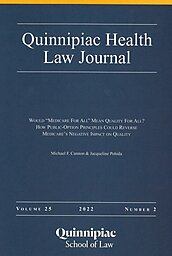Medicare has had a negative impact on health care quality. By the time Congress created Medicare in 1965, research had demonstrated many U.S. physicians and hospitals were providing medical care that was so low-quality as to be dangerous to patients’ health. Congress nonetheless incorporated into the new program features that ensured traditional Medicare would exacerbate existing quality problems. Research accordingly continued to document widespread quality problems, in particular those forms of low-quality care that traditional Medicare rewards with higher payments. Congress and Medicare administrators have resisted correcting these perverse incentives. Only in recent years has Congress attempted to emulate payment rules and quality-improvement tools private insurers have developed, though these efforts have had little if any effect. Congress can reverse Medicare’s negative impact on quality by applying “public option” principles to Medicare, such that traditional Medicare and private insurers compete on as level a playing field as possible.

This work is licensed under a Creative Commons Attribution-NonCommercial-ShareAlike 4.0 International License.

